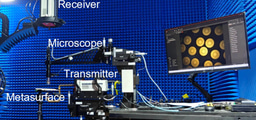Enhancing biological performance by preventive and regenerative interventions for making humanity multiplanetary: Step 1 an antioxidant cocktail
Published in Physics

Andrés Caicedo, Kevin Zambrano, Serena Sanon, Xavier Gómez, Julián Morales, Sarah Villarroel, Samira Asquel
Universidad San Francisco de Quito USFQ, Colegio de Ciencias de la Salud, Escuela de Medicina, Quito, Ecuador
As humanity moves forward to become a multiplanetary species, astronauts and space explorers alike will begin to spend more time outside of Earth’s safety. A longer presence in outer space is hazardous for our health, as the constant exposure to microgravity and ionizing radiation negatively affects our cells and tissues, often leading to disease. In space, crew members will have limited resources to provide optimal medical care to treat the cumulative damage of space radiation in their tissues in a timely fashion. Thus, preventive strategies and regenerative interventions should be developed to reduce health risks of space exploration together with improving spacecraft technology.
Enhancing our biological performance by developing safe and effective prophylaxis and therapies to improve cell repair is key for pre-and post-exposure to space’s harmful environment. The first step to enhance human biological performance in space is to use prophylactic agents that may help the cells of astronauts and space travelers resist environmental damage. This is the focus of our article “Key points for the development of antioxidant cocktails to prevent cellular stress and damage caused by reactive oxygen species (ROS) during manned space missions'', recently published in Microgravity.
In this article, we propose the development of an antioxidant cocktail to enhance our cellular function in order to resist damage and maintain health. We provide comprehensive information about ROS production due to cellular stress on Earth and during space flights, evidence of the use of antioxidants to prevent diseases, a workflow suggesting dosage and ingredients, and the personalization of an antioxidant cocktail. In the workflow, we propose that the cocktail may be adapted to respond to changes in cellular stress by constantly monitoring our health while traveling in space.
A personalized antioxidant cocktail, if developed and proven to be safe and effective, could be easily administered orally or intravenously to space travelers and astronauts in extended monthly missions. Other pharmacological agents could be developed as well to strengthen cells’ capacity to resist hazardous environments in space. However, future missions may take years of travel, making it necessary to not only mitigate cell stress but also to improve our tissue maintenance and regenerative capacity. Together with physical activity, albeit limited, inside spaceships to maintain body fitness, a second step may be the use of regenerative factors to preserve our tissue functionality for a longer time.
Our group studied how mesenchymal stem cells (MSC) are able to reprogram cell metabolism and induce their regenerative effects in proinflammatory cells. Interestingly, MSCs can transfer mitochondria to damaged cells to help them recover. Inspired by this process, we artificially transferred mitochondria to cells damaged by ultraviolet radiation and to surgically wounded tissue, where we observed a faster recovery. It is possible to suggest that mitochondria or other regenerative factors produced by MSCs may be used to maintain the tissue health of astronauts and space travelers. It is also tempting to propose the use of stem cells and their regenerative factors as a second step to enhance our biological performance in space to improve the health of astronauts and space travelers during year-long space missions.
A third step could represent the transient or permanent modification of the astronaut’s or space travelers’ genome or epigenome to permit them to produce additional antioxidants and regenerative factors to preserve their health for future space travel and colonization. Interestingly, today vaccination strategies against COVID-19 are closely related to gene therapy and have opened the door to messenger RNA (mRNA) biotherapeutics. Even if gene therapy and mRNA biotherapeutics need more research to show evidence of their efficacy and safety, this area of study could represent the development of advanced therapies such as protein replacement or inducing the production of exogenous and artificial proteins to protect our bodies from homeostasis disruption due to space travel that can propagate accumulation of cellular damage with time.
The proposed steps and the development of improved prophylactics and therapeutics may boost our capacity to overcome the hazardous environment of space exploration. We invite you to read our article and to think about innovative options for the development of antioxidant cocktails and other molecules to prevent cellular stress and damage. The promotion, development and application of regenerative medicine in space and joint ventures between academic institutions, companies and governments will be important to enhance our biological performance in space and even translate these discoveries to medicine on earth.
Follow the Topic
-
npj Microgravity

This journal aims to provide a thorough understanding of the scientific impact and future of spaceflight research.
Related Collections
With Collections, you can get published faster and increase your visibility.
Space Biomanufacturing
Publishing Model: Open Access
Deadline: Mar 15, 2026






Please sign in or register for FREE
If you are a registered user on Research Communities by Springer Nature, please sign in